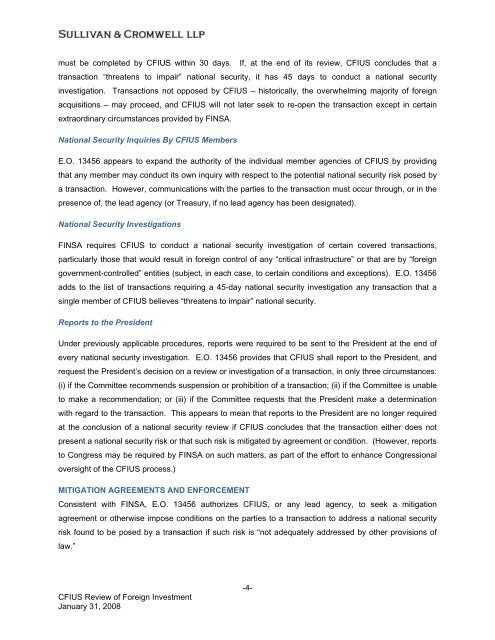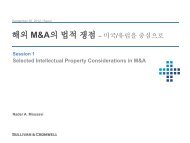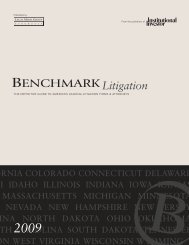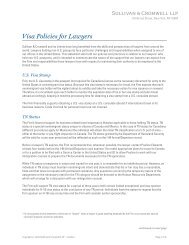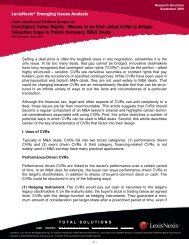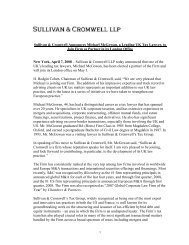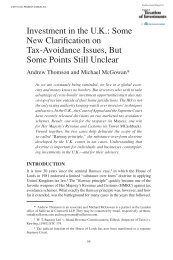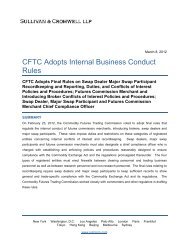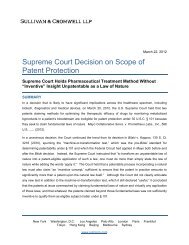Download Full PDF - Sullivan & Cromwell
Download Full PDF - Sullivan & Cromwell
Download Full PDF - Sullivan & Cromwell
Create successful ePaper yourself
Turn your PDF publications into a flip-book with our unique Google optimized e-Paper software.
must be completed by CFIUS within 30 days. If, at the end of its review, CFIUS concludes that a<br />
transaction “threatens to impair” national security, it has 45 days to conduct a national security<br />
investigation. Transactions not opposed by CFIUS – historically, the overwhelming majority of foreign<br />
acquisitions – may proceed, and CFIUS will not later seek to re-open the transaction except in certain<br />
extraordinary circumstances provided by FINSA.<br />
National Security Inquiries By CFIUS Members<br />
E.O. 13456 appears to expand the authority of the individual member agencies of CFIUS by providing<br />
that any member may conduct its own inquiry with respect to the potential national security risk posed by<br />
a transaction. However, communications with the parties to the transaction must occur through, or in the<br />
presence of, the lead agency (or Treasury, if no lead agency has been designated).<br />
National Security Investigations<br />
FINSA requires CFIUS to conduct a national security investigation of certain covered transactions,<br />
particularly those that would result in foreign control of any “critical infrastructure” or that are by “foreign<br />
government-controlled” entities (subject, in each case, to certain conditions and exceptions). E.O. 13456<br />
adds to the list of transactions requiring a 45-day national security investigation any transaction that a<br />
single member of CFIUS believes “threatens to impair” national security.<br />
Reports to the President<br />
Under previously applicable procedures, reports were required to be sent to the President at the end of<br />
every national security investigation. E.O. 13456 provides that CFIUS shall report to the President, and<br />
request the President’s decision on a review or investigation of a transaction, in only three circumstances:<br />
(i) if the Committee recommends suspension or prohibition of a transaction; (ii) if the Committee is unable<br />
to make a recommendation; or (iii) if the Committee requests that the President make a determination<br />
with regard to the transaction. This appears to mean that reports to the President are no longer required<br />
at the conclusion of a national security review if CFIUS concludes that the transaction either does not<br />
present a national security risk or that such risk is mitigated by agreement or condition. (However, reports<br />
to Congress may be required by FINSA on such matters, as part of the effort to enhance Congressional<br />
oversight of the CFIUS process.)<br />
MITIGATION AGREEMENTS AND ENFORCEMENT<br />
Consistent with FINSA, E.O. 13456 authorizes CFIUS, or any lead agency, to seek a mitigation<br />
agreement or otherwise impose conditions on the parties to a transaction to address a national security<br />
risk found to be posed by a transaction if such risk is “not adequately addressed by other provisions of<br />
law.”<br />
CFIUS Review of Foreign Investment<br />
January 31, 2008<br />
-4-


